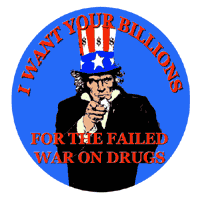Part 7: Articles on Drug Use
Below are short descriptions of five different articles on drug use. The first three articles are provided; the last two are summaries.
Milton Friedman(Nobel Prize winning Economist)
WEBLINK: Milton Friedman - An open letter to Bill Bennet
Friedman, in a letter to William Bennett (summarized below), offers an account similar to what has been said previously. In short, he claims that the goal of limiting drug use is correct (in this sense he admits drug use is immoral), but holds that the means to limit drug use (the "war on drugs"--spending billions a year on more police, jails, higher prison terms, and use of the military in foreign countries) actually makes the problem worse.
For instance, Friedman argues that had drugs been decriminalized in the 1970s (as he and others advocated), crack would never have been invented. Crack, he argues, was only invented because the war on drugs made the cost of cocaine so high that developing a cheaper version would lead to even more profits. The effect of the war on drugs, according to Friedman, is that there is more money spent than ever, more people in jail than before ( America imprisons a higher percentage of its citizens than any other country--the reason is tougher drug laws), more addicts, more violence, and narco-terror in drug producing countries. (For instance, a large portion of Columbia is not controlled by the government but by rebel terrorists who are funded by the huge profits they make in the drug business.)
Friedman argues that a policy of making drugs similar to alcohol and tobacco (legal and regulated) will best reduce the harms associated with drug use and best support freedom, which the war on drugs denies through granting police more power and limiting civil rights.
William Bennett: (Drug Czar under Presidents Reagan and Bush Sr.)
WEBLINK: William J Bennett - a response to milton friedman
Bennett rejects Friedman's arguments on the grounds that allowing drug use is no solution to the problem. Drug legalization is, in fact, surrendering to the problem. Bennett admits that the drug war is very costly, but he thinks that it eliminates hidden costs, which Friedman has overlooked. This is a direct rejection response to the defense of drug use presented above.
Bennett points out that the combination of allowing drug use, reducing the cost of the drugs, and reducing the dangers of drug use (as it is manufactured consistently) is setting the stage for a huge increase in addiction. In addition, as all the incentives not to do drugs (it is really dangerous, really expensive, and very illegal) would disappear, we should expect an explosion of new drug use. Bennett also responds to the comparison drug prohibition to alcohol prohibition by claiming that when alcohol prohibition ended, its consumption jumped 350%. Imagine the social costs of an increase of 350% in drug use? Hospitals overwhelmed with overdoses, massive jumps in the accident and death rate associated with drug use.
Another argument Bennett responds to is the argument that we should treat addicts rather than imprison them. Bennett thinks that treatment only works when the addicts want treatment. (Many of them do not voluntarily enter treatment and forced treatment has a poor success rate.) Bennett also claims that the connection between drug use and crime is also more complex than has been presented.
Bennett does admit that legalization might decrease crime on the supply end. However, he claims that most drug users who commit crimes do not commit crimes to support drug habits, but are instead career criminals who committed crimes before using drugs. This means that lowering the costs of drugs will not alter their motive to commit crimes such that allowing drug use does not lower the crime on the demand side as these people will continue to commit crimes for other reasons.
Bennett advocates a deterrent effect of the drug war. By making drugs more expensive, more dangerous, and by punishing drug users and dealers, we deter others from using. Furthermore, in a nod to Aristotle, Bennett claims that the state "has a responsibility to craft and uphold laws that help educate citizens about right and wrong." Perhaps Bennett and Aristotle would agree that real freedom requires virtuous people, and using drugs is not a virtue.
Nadelmann--"The Case for Legalization"
WEBLINK: Nadelmann - The case for Legalization
Nadelmann thinks that current drug policies have failed and will continue to fail.
 For instance, it is not possible for our military to stop all drug production in other countries. Furthermore, even with the coast guard, DEA, border patrols, and police, we can only stop a small percentage of the drugs being smuggled into this country. As evidence Nadelmann points out that despite the war on drugs, drug prices are constant, drug purity is up, drug availability is up. In fact, Nadelmann thinks that the war on drugs encourages the development of more potent compact drugs as it is easier to smuggle a compact potent drug like cocaine than a bulky drug like marijuana. The pressure put on smugglers by the war on drugs encourages them to ship these more potent compact drugs and also provides forms of the drug like crack to boost profits and minimize risk.
For instance, it is not possible for our military to stop all drug production in other countries. Furthermore, even with the coast guard, DEA, border patrols, and police, we can only stop a small percentage of the drugs being smuggled into this country. As evidence Nadelmann points out that despite the war on drugs, drug prices are constant, drug purity is up, drug availability is up. In fact, Nadelmann thinks that the war on drugs encourages the development of more potent compact drugs as it is easier to smuggle a compact potent drug like cocaine than a bulky drug like marijuana. The pressure put on smugglers by the war on drugs encourages them to ship these more potent compact drugs and also provides forms of the drug like crack to boost profits and minimize risk.
Nadelmann asks us to consider a government war on alcohol and tobacco (both of which are very harmful to users and many others). We reject this sort of war because we realize that it will fail, it will violate our liberty, it will give rise to a black market, it will increase crime, people will ignore the law, and it is silly to arrest tobacco farmers or put them out of work. Further, a war on tobacco and alcohol only increases the "forbidden fruit" motive for kids to try these drugs. It would also involve a massive amount of drug testing, searches, wire taps, and informants. ("I saw my neighbor smoking on his back porch arrest him!") There would also be corruption of government officials and police who will be bribed by the criminal element with their illegal fortunes from the tobacco and booze trade.
Consider our current war on drugs. Who really benefits from it? The two main groups are law enforcement (who are given more funding and more of them are employed) and drug kingpins (who make more money as more is done by law enforcement to drive up the price). The victims of the war on drugs are the drug users, addicts, and low level dealers who are most likely to be arrested and are often involved in the drug trade just for the money.
Just how expensive is the war on drugs? Nadelmann (who wrote this in the late '80s) points out that the government spent $10 billion on the war on drugs in 1987. (This number is much higher today.) There is also the prison factor. For instance, in 1988 one third of all federal prisoners were in jail on drug-related charges. American courts and prisons are clogged with drug offenders, and with increased sentences for possession and trafficking this is only increasing. Nadelmann offers a solution: end drug prohibition. Doing so would mean billions in taxes coming into the government instead of the government spending billions in what amounts to a subsidy to increase drug dealers' profits. Today, millions of alcoholics work and support themselves; by ending prohibition millions of drug users could do the same. (There was an interesting case of a woman who was a heroin user who successfully managed to be a school principle for years, even winning awards for her work. The only reason she was caught is that her dealer bragged about selling heroin to the school principal.) Certainly many drug users can support themselves and lead successful lives rather than have their lives destroyed by a drug offense. (For instance, one arrest for marijuana possession can cost you your school loans and bar you from many future jobs.)
There is also a consistency argument for the end of drug prohibition. We know alcohol and tobacco cause harm  and create addicts, yet we allow them. Why not set a standard of harm that is acceptable and apply that standard to all drugs rather than arbitrarily allow some and not others. Mormons and Puritans, according to Nadelmann, are the most consistent as they abstain from all drugs, including alcohol and tobacco, but also abstain from coffee and chocolate (as they have addictive properties as well and affect the body to
and create addicts, yet we allow them. Why not set a standard of harm that is acceptable and apply that standard to all drugs rather than arbitrarily allow some and not others. Mormons and Puritans, according to Nadelmann, are the most consistent as they abstain from all drugs, including alcohol and tobacco, but also abstain from coffee and chocolate (as they have addictive properties as well and affect the body to ![]() a lesser degree, but in a similar fashion). Nadelman also offers an interesting comparison between a gun dealer and a drug dealer: Both sell a product that many people use safely, yet we know that a percentage of those who buy the product will cause great harm to themselves or others. Yet we do not arrest the gun dealer, so why arrest the drug dealer?
a lesser degree, but in a similar fashion). Nadelman also offers an interesting comparison between a gun dealer and a drug dealer: Both sell a product that many people use safely, yet we know that a percentage of those who buy the product will cause great harm to themselves or others. Yet we do not arrest the gun dealer, so why arrest the drug dealer?
Wilson -- "Against the Legalization of Drugs"
As a member of national council for drug abuse prevention in 1972, Wilson had direct experience shaping early  drug policy. During that time heroin was the drug of concern. Wilson points out that the war on drugs does make a difference. The war on heroin in the 1970s stopped the growth of heroin use and it declined in the 1980s. Furthermore, the war on cocaine in the 1980s led to its decline in the 1990s. Ending prohibition will expand the use of these drugs. If we reduce the price of a Porsche by 95%, will people buy more? So too, by ending prohibition and decreasing the price, drug use will skyrocket.
drug policy. During that time heroin was the drug of concern. Wilson points out that the war on drugs does make a difference. The war on heroin in the 1970s stopped the growth of heroin use and it declined in the 1980s. Furthermore, the war on cocaine in the 1980s led to its decline in the 1990s. Ending prohibition will expand the use of these drugs. If we reduce the price of a Porsche by 95%, will people buy more? So too, by ending prohibition and decreasing the price, drug use will skyrocket.
For example, in England there was a national policy of prescribing heroin to addicts (to reduce the crime and harms associated with the black market). During the same time America , which had more heroin addicts than England , took a hard line on heroin users and dealers. The result was heroin use stagnated and then declined in the US while heroin use exploded in England (as addicts would share their supplies with others, creating new addicts). The cause of the increase in England was an increase in the supply of heroin and a lack of enforcement against users.
The war on drugs is not about ending drug use. Winning the war on drugs is a matter of controlling the drug problem. Ending drug prohibition will lead to an epidemic. Granted, some areas are out of control due to drugs today, but even in these places the people do not call for an end to prohibition, they call for more enforcement. Nadelmann tries to argue that legalization of drugs will lead to a great tax benefit for society that will cover the costs of drug use. However, there is a dilemma here. To cover the high costs of drug use, the tax on drugs would have to be high. But the higher the tax, the more black market crime we will have. Furthermore, many legalizationists call for treatment as the option. Treatment only works when addicts want treatment, most addicts do not want to be treated; they only seek help when they crash and once stabilized they start their habit again.
Legalization would also hamper education efforts: "unlike tobacco, cocaine will not give you cancer or emphysema... everybody is doing cocaine, but you should not?" One of the other tactics of legalization arguments is to compare illegal drugs to tobacco and alcohol. This comparison fails because tobacco and cocaine are both harmful to your health, but we treat them differently because cocaine also destroys the humanity of the user. (We might interpret this as the impact on the brain and personality of the cocaine user.) Similarly, alcohol is clearly harmful, but not nearly as much as crack. Alcohol only appears more harmful because of its common usage. Nadelmann and other legalizationists point out that the harms of alcohol are worse than cocaine. Wilson thinks this is due to the fact that legal drugs are commonly used much more than illegal drugs.
Husak--from Drugs and Rights
Just because something is dangerous is not a reason to prohibit it. There are all kinds of activities people do that  are very dangerous (mountain climbing, for instance), yet we do not restrict them. Comparing the empirical data, we find that nicotine causes more deaths than all other drugs combined. Even when we examine the risks per weekly user, we find that nicotine yields 83 deaths per 10,000 users compared to 29 deaths per 10,000 weekly users of cocaine. Compare this to 4,200 motorcyclists who died, and it is clear that the rate of cyclists who die is higher than the rate of cocaine users. An accurate comparison is that drug use is roughly as dangerous as mountain climbing, and less dangerous than attempting to climb the Himalayas . Drug use may also be less dangerous than driving race cars or boxing, both of which are accepted activities.
are very dangerous (mountain climbing, for instance), yet we do not restrict them. Comparing the empirical data, we find that nicotine causes more deaths than all other drugs combined. Even when we examine the risks per weekly user, we find that nicotine yields 83 deaths per 10,000 users compared to 29 deaths per 10,000 weekly users of cocaine. Compare this to 4,200 motorcyclists who died, and it is clear that the rate of cyclists who die is higher than the rate of cocaine users. An accurate comparison is that drug use is roughly as dangerous as mountain climbing, and less dangerous than attempting to climb the Himalayas . Drug use may also be less dangerous than driving race cars or boxing, both of which are accepted activities.
As for the addiction argument, very few people who try, or occasionally use, a drug become addicts. Less than 5% of recreational cocaine users become addicts, and addiction can be broken. Much of our knowledge of drugs is not based in fact, but upon media portrayals. For much of the media their official policy is to portray drugs as negative. (The federal government actually provides incentives for TV shows to portray drugs negatively.) If an episode carries an anti-drug message, then the network is credited for a public service announcement, meaning they can sell more commercial time rather than use it for public service announcements as required by law. The facts are that most cocaine users (77%) are employed and leading normal lives. The idea that everyone who uses drugs becomes an addict, loses their job, and cannot lead a normal family life is contrary to the facts.
Now that we have examined the history of drugs, general arguments for and against the use of drugs, and some major authors' views on the subject, we can return to some unfinished business. Two issues deserve further mention. First, what would Mill conclude about drug use? Second, even if we reject the full legalizationist arguments for drug use, there is still a consistency issue with regards to marijuana (and any drug with similar effects) that deserves further examination.
